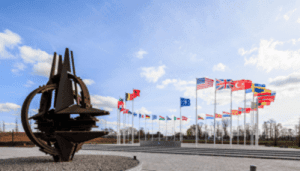TAG: GS 2: INTERNATIONAL RELATIONS
THE CONTEXT: NATO has appointed outgoing Dutch Prime Minister as its next Secretary General, marking a significant leadership transition at a critical time for the alliance.
EXPLANATION:
- Dutch Prime Minister will succeed Jens Stoltenberg on October 1, with the nomination finalized ahead of the NATO leaders’ summit in Washington next month.
- The selection of Dutch PM was spearheaded by major powers within NATO, particularly the United States.
Strategic Challenges Ahead
- Dutch Prime Minister steps into the role at a pivotal moment for NATO, with several pressing issues on the horizon:
- Russian Aggression in Ukraine:
- One of the most immediate challenges Dutch Prime Minister will face is the ongoing conflict in Ukraine.
- NATO’s response to Russia’s actions and support for Ukraine will be critical.
- Dutch Prime Minister has been a staunch supporter of Ukraine, advocating for the provision of F-16 fighter jets to Kyiv.
- US Political Dynamics:
- The upcoming U.S. elections pose potential challenges for NATO’s unity and strategy.
- Former President Donald Trump’s potential return to the White House brings uncertainty, given his previous threats to withdraw the U.S. from NATO and his critical stance on defense spending by other member countries.
- European Defense Spending:
- The Russian invasion of Ukraine has prompted European nations to increase their defense budgets.
- Ensuring that these commitments translate into effective military capabilities will be a key task for Dutch PM.
- China’s Growing Influence:
- Beyond the immediate threat from Russia, NATO must also address the long-term strategic challenge posed by China’s rise.
- Balancing focus between these two major geopolitical threats will be a crucial aspect of Dutch PM leadership.
- Russian Aggression in Ukraine:
Legacy and Expectations
- Dutch Prime Minister inherits a strengthened and more unified NATO, thanks to Stoltenberg’s leadership during a transformative decade.
- Stoltenberg’s tenure saw NATO extend its influence and adapt to new security challenges, including cyber threats and hybrid warfare.
- Rutte’s role will be to build on this foundation and navigate the alliance through its next phase of evolution.
North Atlantic Treaty Organization (NATO):
- NATO is a Western security alliance founded on April 4, 1949.
- NATO’s main headquarters are located in Brussels, Belgium, while NATO’s military headquarters are in Mons, Belgium.
- Its 12 founding members are Belgium, Canada, Denmark, France, Iceland, Italy, Luxembourg, the Netherlands, Norway, Portugal, the United Kingdom and the United States.
- They signed the Washington Treaty, which gets its power from Article 51 of the United Nations Charter, “which reaffirms the inherent right of independent states to individual or collective defence.”
- At the very heart of the alliance is the concept of “collective security” – an attack on any of the members is seen as an attack on all of them and demands collective action.
- This was deemed necessary in 1949 amid the Cold War rivalry between the then USSR and the US, over ideological and economic superiority.
- Article 5 of the Washington Treaty, on collective security, was added “to counter the risk that the Soviet Union would seek to extend its control of Eastern Europe to other parts of the continent.”
- The USSR also aimed to shore up allies and in 1955, the Warsaw Pact was constituted as an alliance of socialist countries.
- However, it doesn’t necessitate direct military intervention constituting all members.
- The scale of action is dependent on each member country “as it deems necessary”.
- The only time the article has been invoked so far was following the September 11, 2001 attacks on the US. NATO forces were sent to Afghanistan and deployed for nearly 20 years.
Membership
- Over the years, NATO has expanded its membership significantly.
- Originally the founding members were 12.
- NATO Member countries are:
- Albania, Belgium, Bulgaria, Bulgaria, Canada, Croatia, Czechia, Denmark, Estonia, Finland, France, Germany, Greece, Hungary, Iceland, Italy, Latvia, Lithuania, Luxembourg, Montenegro, Netherlands, North Macedonia, Norway, Poland, Portugal, Romania, Slovakia, Slovenia, Spain, Sweden, Türkiye, United Kingdom, United States.





